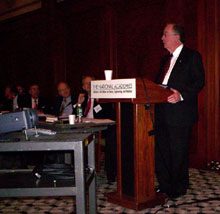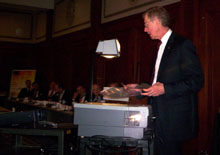URA Council of Presidents
Gets Close-Up of '06 Budget
WASHINGTON , D.C.-- Congressman David Hobson of Ohio, Chairman of the House
Energy and Water Development Appropriations Subcommittee, had welcome words
for the annual URA Council of Presidents meeting on Wednesday at the National
Academy of Sciences. "Science and technology are the future of this country,"
he said.

|
Congressman David Hobson told the URA
Council of Presidents: "We don't have
all the money in the world." (Click on
image for larger version.) |
Yet Hobson admitted he couldn't offer much encouragement following the Secretary of Energy's budgetary request for FY'06, which was announced on Monday. "We don't have all the money in the world," said Hobson, whose subcommittee has budgetary oversight for the DOE and its laboratories. "We'll look at things, and we're trying to learn. We'll make some mistakes. We're willing to talk with anybody. We're willing to be educated. And that's the reason I came here today."
James Decker, Principal Deputy Director of DOE's Office of Science, offered the details for FY'06: DOE as a whole is down 2% ($475 million) from FY'05 appropriations; the Office of Science is down 3.8% ($136.8 million) from FY'05; and High Energy Physics is down 3.1% ($22 million) from FY'05.
As new Secretary Samuel Bodman said on Monday, the Office of Science Budget has no FY'06 funding for Fermilab's BTeV (B-Physics at the Tevatron) experiment. Decker explained the decisions for the Tevatron and the B-factory (BABAR at Stanford Linear Accelerator Center) to run hard had left the difficult choice of not going ahead with BTeV. To have BTeV operating before CERN's Large Hadron Collider began producing B-physics results, Decker said, would require $40-$50 million in FY'06, and "that was not conceivable in this budget."
Fermilab Director Michael Witherell said it was "wrenching to see that experiment canceled. BTeV would make use of the world's second-highest-energy accelerator to explore B-physics in a new way. The experiment just went through a very rigorous DOE review."
The goal for the HEP budget, Decker said, was to maintain leadership in these areas: initial operations of the NuMI/MINOS experiment; and LHC pre-operations, detectors, computing and software infrastructure. On the other hand, there are now no HEP experiments currently under construction. Decker declared it is "critical for U.S. science that we not stand still," but he also explained that the budget process is quite different from a long-term facilities outlook such as the DOE compiled last year.
"The U.S. budget is a year-to-year negotiation," Decker said. "Each year brings
a new negotiation."
The overall decline for DOE funding becomes more complex in considering areas that have had substantial increases: for example, $215 million for nuclear non-proliferation efforts, and $45 million for ITER, the international fusion reactor project that is still seeking a site.

|
Jim Decker, Principal Deputy Director of
DOE's Office Science, at the URA's Council
of Presidents Meeting. (Click on image
for larger version.) |
Decker offered his congratulations to Fermilab "on a great job with the Tevatron. There were technological problems to overcome, but Mike [Witherell] and his crew did a terrific job." He also offered congratulations to NuMI/MINOS, which recently saw its first accelerator-produced neutrinos in the Near Detector. Decker said the experiment "went through difficult times, then did a great job of sticking with the new baseline. We're very happy that we're where we are with NuMI."
John Marburger, Director of the Office of Science and Technology Policy and science adviser to the President, said he anticipated HEP funding would continue at the current level for the next few years, "which is not insignificant if you plan for it." He made a case that science had been "treated very well" in the first four years of the Bush Administration, comparing Office of Science funding in constant 1997 dollars for the years 1997-2001 ($12.9 billion) to the years 2002-2006 ($15.1 billion). He reiterated his view that so-called "flat" funding "makes it possible for us to think long-term, knowing what the federal government will spend in coming years."
On the question of continuing visa delays for foreign scientists, Marburger granted: "I can't tell you that it's fixed, but I can tell you that the right people are talking about it, and in the right way."
Not to change the subject, but Fermilab theorist Joe Lykken changed the subject with a high-energy presentation on the sense of urgency compelling particle physicists to pursue "interesting and important questions of mysterious phenomena that seem to be related in ways we don't understand." Among them: the Higgs, Supersymmetry, extra dimensions, and the possibility of an entirely new physics framework. As Lykken said in introduction: "After a fun morning of talking about budgets, I'm here to remind you what it's all about."
DOE FY2006 Budget Request (PDF)
|